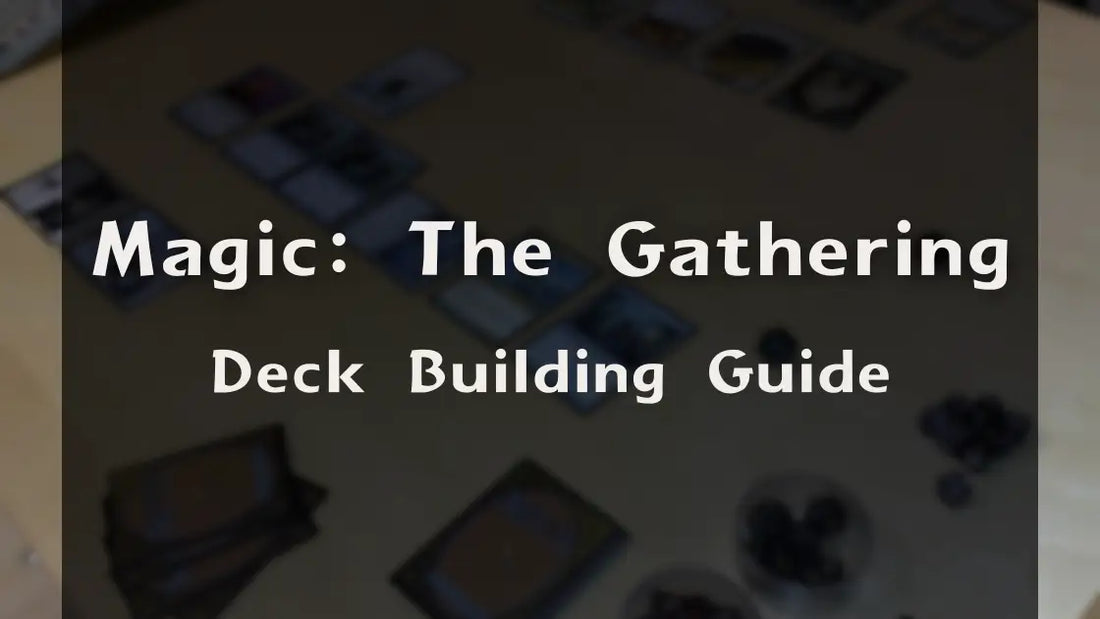
Build the Ultimate Magic: The Gathering Deck – Tips, Tricks & Free Builder Tools!
"How the heck do I build a winning Magic: The Gathering deck without losing my mind?"
If you’ve ever stared at a pile of MTG cards and felt overwhelmed, you’re not alone. Deck building is an art—one that balances strategy, synergy, and sometimes, sheer luck. But don’t worry, whether you're a newbie or a seasoned planeswalker, this guide will help you craft a killer deck using pro tips, free tools, and a little bit of that Magic intuition.
Let’s dive in.
Why Deck Building Matters in MTG
A well-built deck is like a well-oiled machine—each card should serve a purpose. A pile of random powerful cards? That’s a recipe for disaster. But a carefully curated deck? That’s how you dominate FNM (Friday Night Magic) or crush your kitchen table matches.
Here’s the deal:
-
Consistency wins games – A good deck does what it’s supposed to, every time.
-
Synergy > Power – A 0.50 common with perfect synergy beats a 50 mythic that doesn’t fit.
-
Meta matters – Knowing what decks you’ll face helps you tweak yours for success.
So, how do you actually build one? Let’s break it down.

Step 1: Choose Your Playstyle & Format
Before you start slapping cards together, ask yourself:
-
What format am I playing? (Standard, Commander, Modern, Draft, etc.)
-
Do I like aggro, control, combo, or midrange?
-
What’s my budget? (Because, let’s be real, MTG ain’t cheap.)
Popular MTG Deck Archetypes:
|
Type |
How It Plays |
Example Deck |
|
Aggro |
Fast, aggressive, wins early |
Red Deck Wins (Burning opponents to a crisp) |
|
Control |
Slows the game, counters everything |
Azorius Control (No, you don’t get to play Magic today) |
|
Combo |
Wins with a specific card interaction |
Thassa’s Oracle + Demonic Consultation (Instant win) |
|
Midrange |
Balanced, adapts to the game |
Jund (Goodstuff.dec) |
Personal Insight: I once built a janky lifegain deck thinking it was unbeatable… until my buddy wiped me out with a $20 goblin aggro deck. Lesson learned—know your playstyle before investing.
Step 2: The Golden Ratio – How Many Lands, Creatures, Spells?
A balanced deck follows a general structure:
|
Card Type |
Typical Count (60-card deck) |
|
Lands |
22–26 (Adjust based on curve) |
|
Creatures |
20–28 (Depends on strategy) |
|
Spells |
10–18 (Removal, counters, buffs) |
Quick Tip:
-
Low-curve aggro? Maybe 22 lands.
-
Big mana control? 26+ lands.
-
Commander? 35–40 lands (and always run Sol Ring).
Step 3: Mana Curve – Don’t Get Stuck!
Your mana curve is how your spells are distributed by cost. A smooth curve means you’ll always have plays.
Bad Curve: All 6-drops = You die before casting anything.
Good Curve: Mostly 1–3 drops with a few finishers = Consistent pressure.
Example Curve for an Aggro Deck:
-
1-drops: 8–12
-
2-drops: 8–10
-
3-drops: 4–6
-
4+ drops: 2–4
Step 4: Synergy & Win Conditions
Every deck needs a win condition—the way it plans to close out the game.
-
Aggro: Swarm with creatures, burn spells.
-
Control: Lock down the game, drop an unbeatable finisher.
-
Combo: Assemble a 2–3 card “I win” button.
Case Study: My First Competitive Deck
I built a budget Izzet Spellslinger deck (thanks, Draft Boosters) focusing on cheap spells and [[Young Pyromancer]]. It wasn’t flashy, but churning out 1/1 tokens while burning opponents worked shockingly well.
Step 5: Test, Tweak, Repeat
No deck is perfect on the first try. Playtest, adjust, repeat.
-
Goldfish Testing – Play against an imaginary opponent.
-
Use Free Builders – Archidekt lets you tweak decks digitally.
-
Play Against Friends – Real games expose weaknesses.
Common Fixes:
-
Too slow? Add cheaper spells.
-
Running out of gas? Include card draw.
-
Always mana screwed? Adjust land count.
Free MTG Deck Builder Tools
Don’t waste time (and money) on duds—use these:
-
Moxfield – Great for sharing & testing.
-
Archidekt – Super visual, easy to organize.
-
MTG Goldfish Meta Decks – See what’s winning tournaments.
FAQ – Magic: The Gathering Deck Building
Q: How many lands should I run in a 60-card deck?
A: Usually 22–26, but aggro decks can go lower (20–22), while control may need more (25–27).
Q: What’s the best budget deck for beginners?
A: Mono-Red Aggro or Mono-Blue Tempo—both are cheap and effective.
Q: How do I beat control decks?
A: Play aggressively, bait out counterspells, and run cards like [[Duress]] to disrupt them.
Key Takeaways
✔ Know your format & playstyle before building.
✔ Balance your mana curve—don’t overload on high-cost spells.
✔ Synergy > Raw power—a 0.50 common can outplay a 50 mythic.
✔ Test & tweak—no deck is perfect on the first try.
✔ Use free tools like Moxfield to save time & money.
Final Thoughts – Ready to Build Your Ultimate Deck?
Deck building is one of the most rewarding parts of MTG. Sure, it can be frustrating when your masterpiece gets wrecked by a $20 goblin deck (been there), but that’s how you learn.
Now it’s your turn! Grab some MTG cards, fire up a deck builder, and start crafting. And hey, if you brew something spicy, drop it in the comments—I’d love to see it!
Happy brewing, Planeswalker. 🚀

